• Ueshima Tadao Shoten was founded in Kobe.
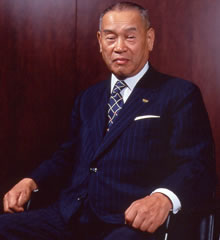
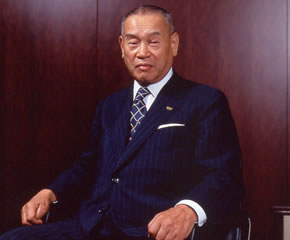
“The Father of coffee in Japan”
• Ueshima Coffee Co., Ltd. was established with capital of 1 million yen; the Tokyo branch was opened.
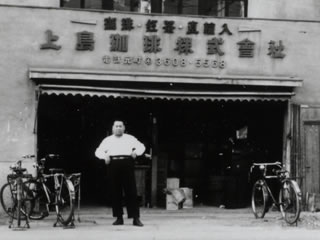
• The first UCC building, formerly the Kobe Headquarters, was established.
• The UCC president, Tadao Ueshima, was appointed by the Japanese government to lead a team sent to observe how coffee was produced in Ethiopia and three other countries in East Africa.
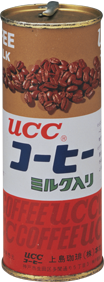
• UCC developed the world’s first canned coffee beverage and began manufacture and sales.

• UCC Coffee Co.,Ltd., a manufacturer of coffee for brewing, was established in Takatsuki-shi, Osaka.
• Construction was completed for the factory now known as the Osaka Factory, Japan’s first fully automated plant. The plant was the first in Japan to manufacture vacuum-packed coffee.
• UCC began the nationwide rollout of UCC Coffee Bazaar, a specialty store offering roasted beans and custom grinds.
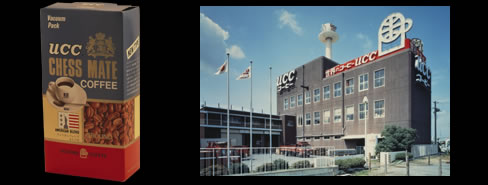
• The industry’s first TV commercial for
home-use coffee for brewing was screened.
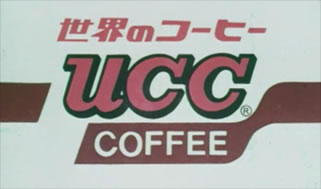
• Tadao Ueshima represented Japan at the international coffee conference held in Mexico and gave a speech about coffee consumption in Japan.
• Construction was completed for what is now known as the Fuji Factory, the main plant for whole beans and ground coffee.
• UCC established Hills Bros. Coffee (Japan) Inc.
• Tadao Ueshima became chairman and Tatsushi Ueshima became president of Ueshima Coffee Co., Ltd.
• The All Japan Coffee Association was established and Tadao Ueshima became its first chairman.
• The UCC Blue Mountain Coffee Estate was opened in Jamaica.
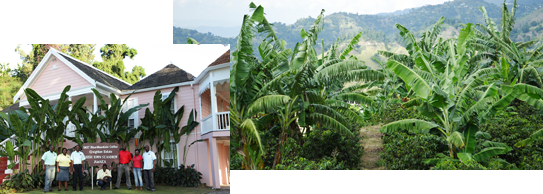
• UCC became an official sponsor of Tokyo Disneyland.
• UCC established a subsidiary in Brazil.
• UCC opened a Singapore office.
• UCC established a joint venture to process and package coffee beans in Taiwan.
• UCC established a joint venture to operate coffee shops in Hong Kong.
• The UCC Coffee Museum was opened on Port Island in Kobe.
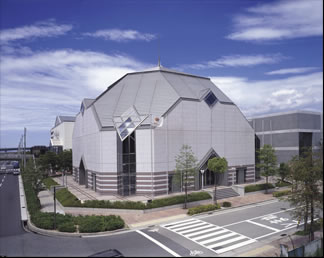
• UCC established a subsidiary in the U.S.
• The UCC Hawaii Kona Coffee Estate was opened in Hawaii.
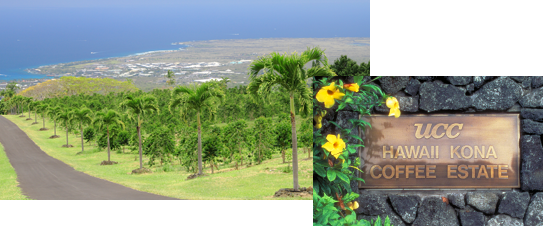
• UCC collaborated with Dutch firm Douwe Egberts to introduce its Moccomat® (now Cafitesse®) systems in Japan.
• The company name was changed to UCC Ueshima Coffee Co., Ltd.
• The Japan Fair Trade Coffee Council was launched and Tatsushi Ueshima became its first chairman.
• UCC Ueshima Coffee Head Office was completed on Port Island in Kobe.
• Construction was completed for the factory now known as the Hyogo Beverage Factory.
• Construction was completed for the Rokko Island Factory.
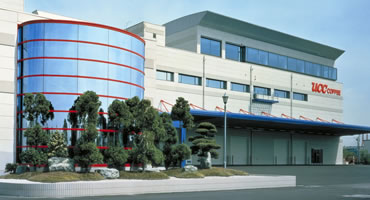
• UCC established a subsidiary in Shanghai, China.
• UCC became the first company in the coffee industry to obtain ISO 9001 certification at all its factories.
• UCC became an official sponsor of Tokyo DisneySea.
• The Specialty Coffee Association of Japan was established and Tatsushi Ueshima became its first chairman.
• The UCC Coffee Academy was opened.
• UCC obtained trademark use and trading rights for Caffè Greco.
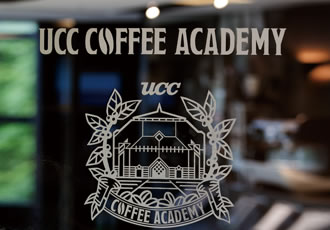
• UCC Blue Mountain Coffee Estate in Jamaica became the first coffee estate in the Caribbean to obtain Rainforest Alliance certification.
• Tatsushi Ueshima became Representative Director-Chairman of UCC Ueshima Coffee Co., Ltd. and Representative of the UCC Group.
• Gota Ueshima became President and Representative Director of UCC Ueshima Coffee Co., Ltd. and CEO of the UCC Group.
• UCC Holdings Co.,Ltd. was established.
• UCC opened a local office in Vietnam.
• Construction was completed for the Shiga Factory.
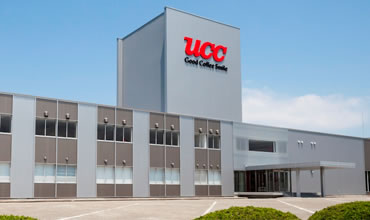
• UCC opened the UCC Coffee Village in Kobe (featuring the UCC Coffee Museum, UCC Coffee Academy, and UCC Training Center)
• UCC opened the UCC Coffee Academy Tokyo.
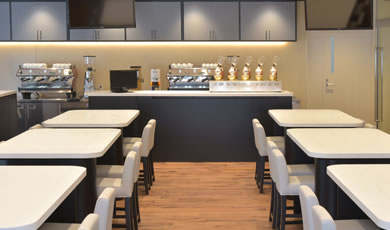
• Established a joint corporation in Singapore.
• Established SOLO FRESH COFFEE SYSTEM Co., Ltd.
• Opened concept coffee shop that offers an assorted specialty coffees in the world, COFFEE LOVER's PLANET in Taiwan.
• Started full-fledged operation in UCC Gunma Factory to manufacture beverages.
• Established joint venture companies, “PT. BAHANA GENTA VIKTORY” and “PT. UCC VICTO ORO PRIMA” in Indonesia, and started manufacturing and sales of regular coffee.
• Established “FOODS FRIDGE CO., LTD.”
• Established a subsidiary in Singapore
• Established UCC INTERNATIONAL CO., LTD.
• Established a subsidiary in Vietnam.
• UESHIMA COFFEE FOODS Co., LTD. became a subsidiary.
• Established joint corporations in Philippines and Thai.
• Established UCC Innovation Center at Kobe headquarters site.
• UCC Milk-Coffee is certified by GUINNESS WORLD RECORDS™
as the Longest-selling ready-to-drink canned coffee brand.
Record achievement: 49 years (1969-2018) Certified in 2018
• Concluded a business partnership with QBIT Robotics.
• Opend UCC Coffee Academy in Philippines.
• Established a regular coffee manufacturing factory in Taiwan.
• ART COFFEE CO. LTD. became a subsidiary of Unicafe Inc.
• Transferred Melcard business from UCC Foodservice Systems Inc. to UCC.
• Transferred and consolidated the Keurig business from UCC to Unicafe Co.
• The brown, white, and red color combination in “UCC Milk Coffee” was registered as a color- only trademark with the Japan Patent Office.
• Established UCC Coffee Trading Pte. Ltd. in Singapore.
• Established a share assignment agreement with Garden Ltd. that provides support services for introducing “office café service”.
• Established Kups Co., Ltd.
• UCC Foods Co., Ltd. changed its name to UCC Coffee Professionals, Co., Ltd.
• Opened the UCC Coffee Roastery in Bangkok, Thailand.
• UCC Coffee Academy launched a new online seminar course.
• Transferred Art Coffee’s Yamanashi Plant to UCC.
• Established new management policy and changed corporate message to “Every coffee, every moment”.
• Established Coffee Style UCC Co., Ltd.
• Established UCC Coffee Australia Limited in Australia, and UCC Coffee New Zealand Limited in New Zealand.
• Established the UCC Sustainability Direction.
• Forged new partnerships with environmental groups and suppliers around the world as we push for 100% Sustainably Sourced UCC branded Coffee by 2030
• Delayed construction of the new UCC roastery in Yamanashi
• Signed a partnership agreement with the environmental NGO Conservation International
• UCC Hawaii Kona Coffee Estate became the first Japanese company to receive certification under GLOBALG.A.P., an international production process management program
• Set new targets for the “coffee x health” field under the UCC Sustainability Direction
• Became the first company in Japan to submit a patent application* for hydrogen roasting (*In-house research as of May 12, 2023, Japan public patent information)
• Decided to introduce large-scale hydrogen-fueled roasters at the UCC Fuji Factory (scheduled to begin operation in April 2025)
• Began selling Yoined, Japan’s first* “edible coffee” manufactured via proprietary methods
* Patent No. 6849552
Roasted coffee beans are ground and then combined with coffee oil extracted from separate coffee beans (1-5% final product content). Hydrogenated oil is kneaded into the mixture, which is then shaped and hardened. Finally, the pieces are coated with finely-ground coffee mixed with coffee oil and hydrogenated oil. This manufacturing process locks in rich coffee aromas to create a snack bursting with coffee flavor.
• Established UCC Holdings Pte. Ltd. in Singapore to act as our global headquarters and began managing UCC Japan Co., Ltd. as a domestic group company (the name of UCC Holdings Co., Ltd. was also changed to UCC Capital Co., Ltd.)

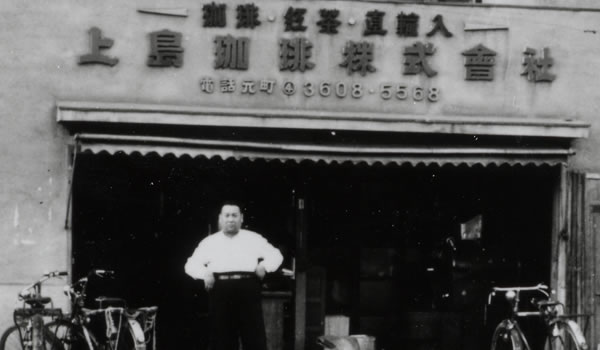
In 1868, the port of Kobe was opened, and along with it entered a range of elements of Western culture that quickly took root in Japan. In 1933, Tadao Ueshima, who had founded a wholesale business in Kobe dealing in butter, jam, and other Western food products, was amazed when he sampled his first cup of coffee at a shop.
Was there anything else as delicious and deep as this?
In Kobe, where the locals loved the latest and the greatest, coffee was sure to sell, he thought.
With this instinct as his compass, Tadao immediately set about launching a roasted coffee business. The coffee shops that were beginning to gain popularity at the time played classical music and were places where people gathered for friendly chats. The focal point of this experience was, of course, the coffee. This new, modern beverage had captured people's attention in the blink of an eye.
However, with the start of WWII, coffee was banned for import, so the business was put on backburner.
It was 1950 when the import of coffee was finally reopened. Tadao was at the ready, having begun talks for the import of Colombian coffee before the pack. People were craving coffee, and he was there to provide it. Using the advantage of his position in Kobe, with its port for international trade, the "Coffee King" would go on to devote his life to coffee.

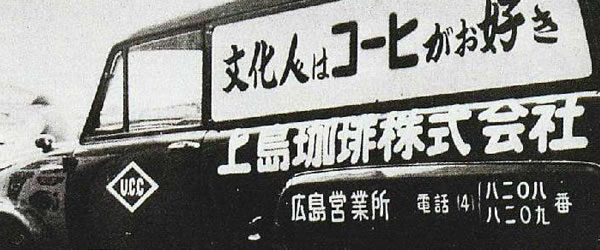
What had to be done to bring coffee out of the domain of a privileged few and into the cups of the masses?
Tadao battled with this question. In 1955, seeking to get more people to come to the shop, he devised the catchphrase, "Civilized folk like coffee." The image of coffee as cool and stylish resonated with consumers.

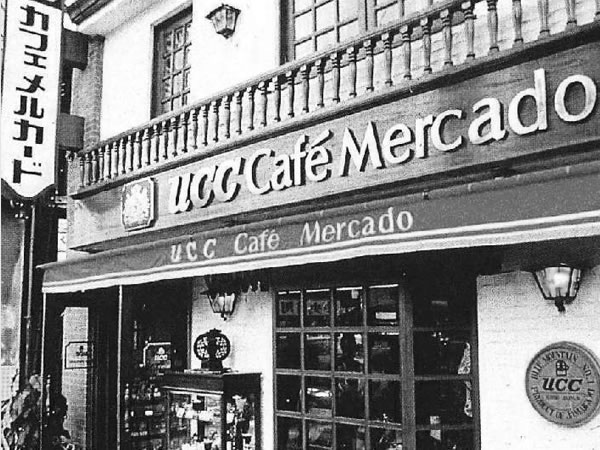
In 1965, Tadao opened a full-fledged, authentic coffee shop in an underground arcade in Sannomiya, Kobe.
Choosing to move from a wholesaler of roasted coffee to a direct point of sale was a bold decision: it meant Tadao's clients would now become his competitors. However, he was confident that what he had learned directly from customers at the shop about their needs and preferences could be used to produce better products that would bring ground coffee to more and more people.
Making coffee a household beverage enjoyed by everyone would, in turn, help the coffee industry grow by leaps and bounds.
Tadao was not content to think about his own interests as a single business operator. He was thinking big, with the concerns of the coffee industry as a whole in mind. This conviction came from his desire to have people truly enjoy coffee with peace of mind - meaning that all steps, from the initial import to its presentation at a patron's table in a café, could not be left to chance.

One day, Tadao was drinking bottled coffee milk while waiting on a train station platform. The train blew the whistle for boarding, so he rushed back to the shop to dispose of the glass bottle without having finished the drink.
"What a waste," he thought. This would be the clue for his next invention.
Bottling coffee in cans would allow passengers to bring them aboard the train.
Thus began the world's first project to develop canned coffee beverage.
The road to realizing the product was a long and trying one. Tadao burned the midnight oil reading book after book on the subject and conducting experiments. Slowly but surely, each hurdle was cleared. Artificial sweeteners had been taking off at the time, but Tadao deliberately avoided them, committed to creating a product that used sugar and milk.
In April 1969, the world's first canned coffee drink was born.
Visitors to the Expo '70 in Osaka, along with booth guides, fell in love with the new canned drink.
When Tadao confidently launched the product out into the world, others in the industry acted as if he were a heretic, shunning him. However, the Expo '70 was the decisive stroke, sending canned coffee sales skyrocketing.
Taking the Expo hall as a large market ripe for the seizing, Tadao revealed the drink and was met with cries of, "Delicious!" with orders flooding in.
Quality products will always sell.
This was the turning point that would make coffee a familiar product to people nationwide.

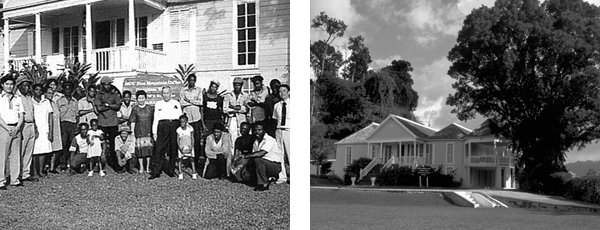
Aiming to secure a stable supply of even better coffee beans, UCC was one of the first to independently travel to the world’s growing regions and build partnerships there.
Tadao Ueshima had one long-running dream. It was to open a coffee estate overseas – not just any estate, but one in Jamaica devoted to the cultivation of Blue Mountain coffee beans. the finest in the world.
Tadao wanted to take the rare Blue Mountain coffee and provide it in a stable fashion to Japan. He wanted to see the product through to completion, being personally involved in its cultivation and on through shipment as a final item.
This was the long-cherished dream of a man who had devoted his life to the coffee industry. In October 1981, his ambition became reality, with a directly-managed estate opening in Jamaica.
Tadao wanted to bring coffee to as many people as possible.
That drive spawned Japan’s coffeehouse culture and developed into a newfound passion for drinking the brew. Through the development of canned coffee, Tadao made it possible to enjoy coffee anywhere, something now the norm. The directly-managed coffee estate achieved traceability of the beans and delivered trust and peace of mind to customers.
These dreams and romance surrounding coffee continue to play a role in Japan’s unique coffee culture.

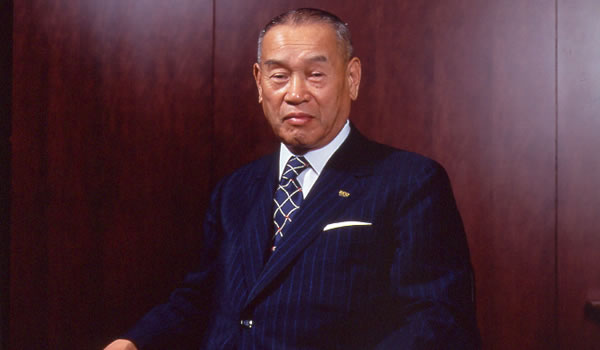
Tadao was unflagging in his commitment to the company’s founding ideals.
A monument in Tadao’s hometown of Nara celebrates his life lived through coffee:
“A life spent contributing to society through coffee – this is bliss, with no regrets.”
In 1988, Tadao was bestowed a monument from the International Coffee Organization for his numerous contributions to coffee.
The monument refers to Tadao as “the father of coffee in Japan.”
